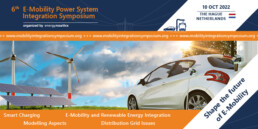[Video] The Importance of the AFIR with Koen Noyens (EVBOX)
AFI Regulation
Explained by our member EVBOX
When it comes to charging infrastructure for electric vehicles, the Alternative Fuel Infrastructure Regulation or AFIR is one of the most important EU policy files being discussed today. It defines the legislative framework for public charging for the next decade and is instrumental to realising the Green Deal.
The AFIR is indeed vital for realising a dense, accessible and user-friendly charging network across Europe.
The Platform for electromobility is a strong advocate for creating a uniform EV charging market through binding targets set at Member State level. We believe that through a harmonized Regulation, we can avoid the risk of creating a two speed Europe regarding the EV charging rollout.
The Platform supports both ambitious fleet-based targets as well as distance-based targets across the European highways network.
We need to get going now. We call on the European Parliament and the Council to agree on an AFIR fit for the Green Deal. There is no time to lose to reach our climate targets! You can find more details on our recommendations on Commission’s proposal under the video.
"A Contresens" documentary in the European Parliament - Replay
A documentary separating the facts from the fiction about electromobility!
Live-streamed from the European Parliament on 7th September - 18:00
Zero-emission vehicles has been a huge topic on our agendas recently, and by 2035, these kind of vehicles will be one of our main means of transport. But do we really know what is inside electric cars and how do the supply chains really work?
To help policy makers better understand these questions, the documentary: “A CONTRESENS: electric vehicles, the great intox” (in French with English subtitles) will be proposed to MEPs on 7 September 2022 at 18:00 in the European Parliament.
We are pleased to inform you that the event will be live-streamed for external stakeholders so you can view the documentary and subsequent debate between MEPs and the movie makers Jonas Schneiter and Zelda Chauvet.
The documentary reveals the quest of two citizens in search of truth and coherence regarding zero-emission mobility. To separate the facts from fiction, engineer Marc Muller and journalist Jonas Schneiter set out to investigate what is behind electric vehicles. For two years, they went into the field to verify and/or challenge stereotypes. The findings of this investigation are summarised in the documentary film “A Contresens”.
For any question please contact: event@platformelectromobility.eu
[Video] Batteries are well placed to help Europe navigate the current energy crisis
Batteries Regulation
Europe's main asset toward energy security
Batteries are necessary to fast forward electromobility, they store green energy, and can ensure critical infrastructure runs smoothly. In other words, batteries are critical to achieving the EU Green Deal objectives, and for the transition to renewables and electrification.
But the battery industry needs a fit for purpose policy framework to do so. In December 2020 the European Commission, proposed the new Batteries Regulation which is now being negotiated in trilogue.
It is key that the new Regulation enables a sustainable and competitive batteries value chain on our continent. The Regulation needs to introduce regulatory visibility for all players along the value chain on key aspects, including:
First, well-thought through timelines that would balance the need for a quick implementation of the Regulation, whilst ensuring robust methodologies are developed.
Second, future potential restrictions of substances must take into consideration the impact onachieving strategic autonomy for the EU battery sector, the performance of EV batteries, and the closed loop of the substances needed for batteries.
And finally, correct definitions: of batteries as final products, and of the battery producer for Extended Producer Responsibility coherence. This will help establish a level playing field within and outside of the European Union.
We salute the Czech Presidency’s emphasis on promoting the EU energy security amid these uncertain times, and want to stress that batteries are naturally well placed to help Europe navigate the current energy crisis. We call for the Presidency to focus its attention on the Batteries Regulation
[Video] The importance of the Energy Performance of Buildings Directive with Luka De Bruyckere (ECOS)
EPBD
The importance of private charging
If Europe is to succeed in its transition towards zero-emission mobility, the correct charging infrastructure needs to be put in place
Here, the deployment of private charging is of the utmost importance: 90% of all charging takes place at home or in the workplace. About 10% of charging will be done at public charging stations, either at fast charging stations on the highway for long distance trips or at slower charging stations for drivers who cannot charge at home. We at the Platform for electromobility want to make sure as many people as possible can charge at home.
The European Commission has recently proposed requirements to ease the installation of charging stations in building like condominiums or offices, as well as mandatory installation of charging stations at new and renovated buildings. These are very positive steps forward.
But we also need to make sure charging stations are easily installed in existing buildings as well because 4 out of 5 buildings will still be in use by 2050, and a large proportion will not be renovated any time soon it’s clear that we need to include existing buildings in the legislation now.
Also, the legislation should require the deployment “smart” technologies for vehicles. These can postpone charging or return electricity to the grid or the building. This presents opportunities for EV drivers: reduced energy prices, improved charging experience and increased renewable energy use. It is key that all newly installed chargers in buildings are capable of smart charging.
Finally, the right to plug should truly facilitate the installation of a charging station. This right does not really exist if construction costs are too high. This is why we also need to reinforce the measures to ensure pre-cabling: installing the cables needed to connect a charging station later on.
[Video] The need for flexibility services for deployment of electromobility - Brieuc Giard (SmartEN)
e-in-picture” allowfullscreen>
EV Charging:
How to smart in the grid smartly?
Smart charging is a technology that enables communication between the electric vehicle and the electric grid when the car is plugged. Smart chargers can adjust the power input into the car very quickly depending on external signals like, prices, the stress on the grid or renewable energy production nearby. Those adjustments of power provide benefits to the EV driver and to the grid.
By turning EVs into a flexible asset, smart charging would help to integrate road transport into the energy system. This means we can optimize the use of the grid and reduce the investment needed . Smart charging will also help manage the availability of renewable energy, inherently variable. And therefore increase renewable penetration.
Smart charging will empower consumers in the energy transition by transforming their own vehicle into an flexible energy asset, a battery on wheels, and allow them to charge when electricity price is low.
Bidirectional charging is a technology that allow EVs to not only modulate the flow of energy, but send it back to a connected asset or to the grid. It would multiply the benefits for users and the grid.
[Video] The win-win relationship between EVs and renewable energies with Ivan Komusanac (WindEurope)
EV - RES
Synergies for the climate
We need to electrify our transport sector to cut our reliance on fossil fuels. This is needed to achieve our climate goals and energy security. And the more electric vehicles we have on our roads, the more wind turbines we will need to power them.
It’s possible to use electric vehicles without adding pressure on the electricity grid. Smart and bidirectional charging allow us to do that. And it can also help us integrate additional renewable energy capacity.
Everyone wants to pay less for charging their electric vehicles and that is achievable by installing more renewable power capacity. Legislation must help as much as possible. But how to make it happen?
European countries should ensure that permitting of renewable energy sources is done much simpler and faster. And they should allow electric vehicles to realise their full potential by allowing them to provide grid services.
Finally, the joint development of electric vehicles and renewable energy power plants represents great job opportunities for many Europeans. We must ensure that they have the right skills they need to accompany the transition. Find more details on our recommendations on the platform’s website.
[Video] The importance of decarbonising corporate fleets first with Thomas Neumann (AVERE)
Corporate fleet
We must look at the 99%
Corporate fleets are both a challenger and a great enabler for the decarbonation of transport. Europe should act and here is why:
Company cars are often underestimated because they represent 20% of the car park but, they are usually driven twice more than individual cars, they emit 50% of total road transport CO2 emissions and represent 62% of new car registrations! This is therefore a key lever to decarbonize transport. Company cars quickly become private cars via the second-hand market. This is called the “Trickle-down effect”
At the Platform for electromobility, we therefore believe we should first act to decarbonize corporate fleets by mandating their decarbonization. There would be a clear benefit: ensuring a large second-hand market after they are no longer used by companies and therefore making clean transportation more accessible to all. It is urgent to act at EU level to take the cost of the transition off people’s shoulder.
The is at the moment only one legislation at EU level to push large fleet to drive cleaner: the clean vehicle directive. Since 2021, it pushes member states’ public service to change their fleet to new, non-polluting vehicles. On paper it is a great idea but it only cover 1% of all fleets. We need to decarbonize the 99% left
6th E-Mobility Power System Integration Symposium
– 10 October 2022 – Delft / The Hague, Netherlands
Supported by the Platform for electromobility, the purpose of the E-Mobility Power System Integration Symposium is to discuss the challenges that arise with increased power demand due to electric vehicle charging, and how they can be met by coordinating with renewable power production in the electrical system. The selection of topics also highlights the need for integrating the required electric vehicle charging infrastructure with the expansion of the distribution and transmission system.
The Symposium offers a prime opportunity to discuss the significant future impact of electromobility on power system design and operation. It aims to bring together experts on electric vehicles, charging infrastructure, power system operators, and stakeholders of the renewable energy industry as well as power system regulators and universities.
Discover the agenda HERE
Registration HERE
Find more information on the Symposium website.


